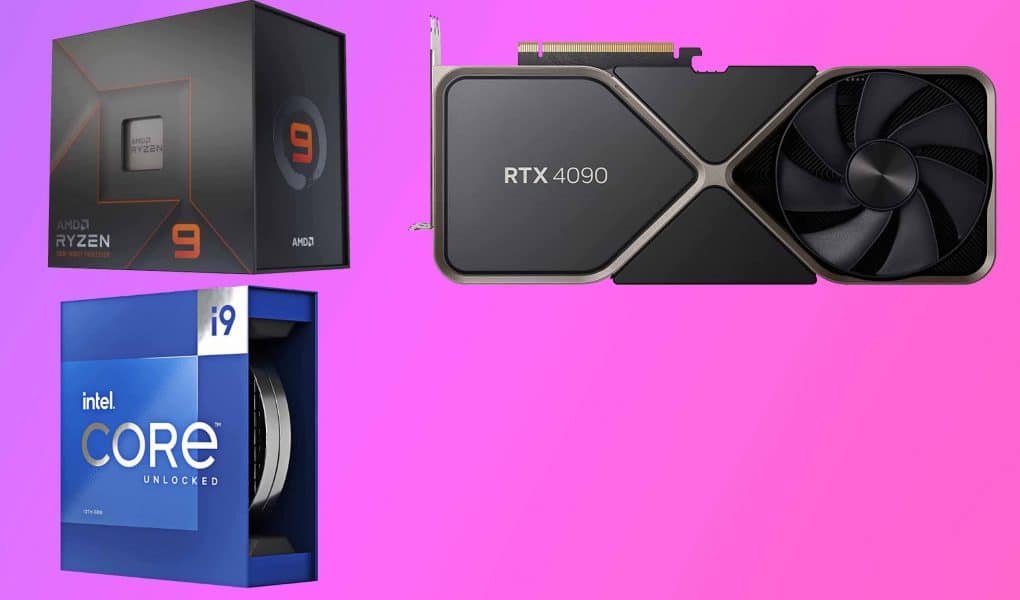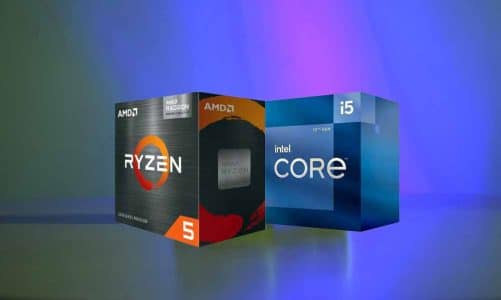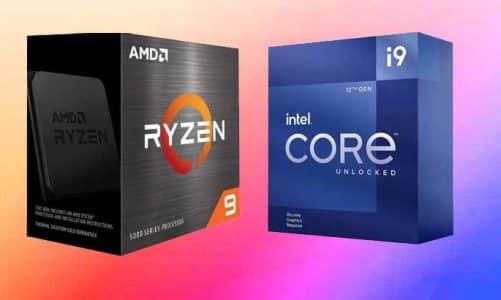Nvidia has finally launched the RTX 4090 into the consumer market. It’s been a long time since everyone has been desperately waiting to get their hands on Ada Lovelace cards. Now that we have access to them, it’s time to buy the best CPU for RTX 4090 to build our dream machine this season.
On another side, Intel and AMD both have also launched their latest chips on the market. Intel has introduced their 13th-generation (Raptor Lake) CPUs with most of them having 24 cores and 32 threads to deliver unbeatable performance when paired with Nvidia RTX 4000 cards.
Whereas AMD’s Zen 4 7000 Series CPUs always pack some serious power onto their end to crush the toughest of gaming workloads. The latest generation of Intel and AMD CPUs support DDR5 DIMMs, so pairing either of these CPUs with RTX 4000 cards would bring tons of FPS in any AAA title.
CPUs like AMD Ryzen 9 7950X and Intel Core i9 13900K are our top considerations for a powerful card like RTX 4090. No doubt, these processors are expensive to get at the moment, but going with one of these would make your PC future-proof for upcoming years.
We’ve also included some low-budget CPUs to pair with RTX 4000 Series cards. If you have a strict budget in mind, then going with those cheaper CPUs would put less strain on your wallet. But at the same time, you’ll lose those extra frame rates that you may get with higher-end CPUs.
Quick Shopping Tips
- Clock Speed: RTX 4090 is a faster graphics card with a base clock speed of 2.3 GHz (Founders Edition version). So, to keep up with the pace of this card, you’ll have to go with a CPU that comes with a higher clock speed on each of its cores. We have to make sure there’s a minimal bottleneck between your CPU and GPU to squeeze out the maximum performance.
- PCIe 5.0: The RTX 4090 supports the PCIe 5.0 interface, so opt for a CPU that natively supports the PCIe 5.0. By doing so, your CPU will be aligned with the higher bandwidth that RTX 4090 offers. Ultimately, this will result in reduced latency and higher performance by the end of the day.
List of the Best CPUs for Nvidia RTX 4090 GPU
Here are the top options to consider:
| CPU | Architecture | Cores/Threads | Boost Clock Speed | Socket |
| AMD Ryzen 9 7950X | Zen 4 | 16/32 | 5.7 GHz | AM5 |
| Intel Core i9 13900K | Raptor Lake | 24/32 | 5.8 GHz | LGA 1700 |
| AMD Ryzen 9 7900X | Zen 4 | 12/24 | 5.6 GHz | AM5 |
| AMD Ryzen 7 5800X3D | Zen 3 | 8/16 | 4.5 GHz | AM4 |
AMD Ryzen 9 7950X – Overall Best Pick
Architecture: Zen 4 | Cores: 16 | Threads: 32 | Base Clock Speed: 4.5 GHz | Boost Clock Speed: 5.7 GHz | TDP: 170W | Socket Compatibility: AM5
Reasons to Buy:
The Ryzen 9 7950X is a phenomenal chip in AMD’s Zen 4 architecture with a higher boost frequency to crush any 4K gaming or productivity workloads you’ll throw in its way.
Also, it brings you DDR5 and PCIe 5.0 connectivity right out of the box. If you need a reasonably priced CPU, then the Ryzen 9 7950X fits in that equation right away. Finally, it comes with RDNA 2 iGPU to support the basic display output.
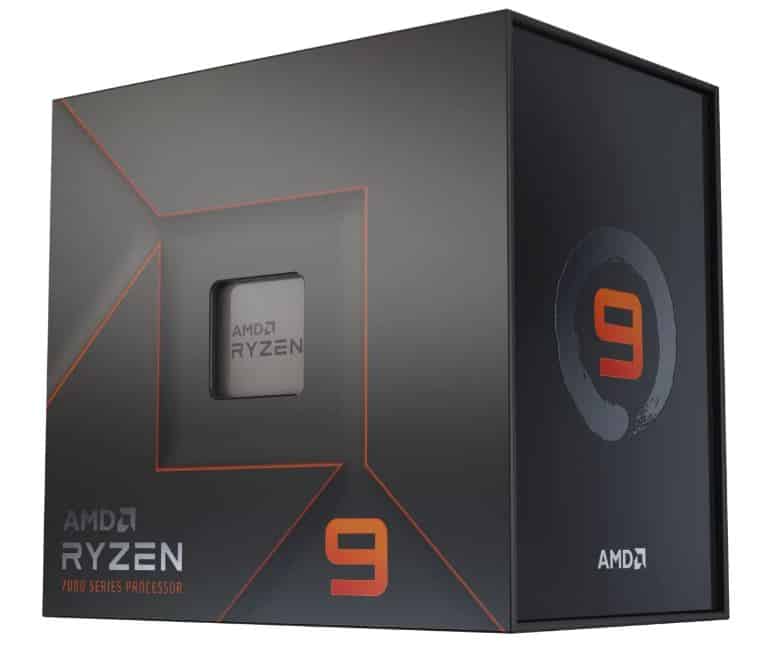
The AMD Ryzen 7000 chips are built on the Zen 4 architecture with an increased 13% IPC and TMSC 5nm process, leading to the CPUs with a boost clock speed of up to 5.7 GHz. The Ryzen 9 7950X is the flagship CPU from the Red Team that fires back at its competing chips in Intel’s Raptor Lake Series.
The AMD Ryzen 9 7950X is 16% faster in AAA gaming, 20% better in single-threaded, and 40% better in multi-threaded workloads as compared to the previous generation AMD CPUs. In some benchmarks, it even goes head on head with AMD’s Threadripper 5000 Series processors.
The Ryzen 9 7950X with 16-cores and 32-threads is cheaper at its launch price if we compare it with the previous generation Ryzen 9 5950X CPU.
Priced at $699, the Ryzen 9 7950X is the fastest CPU that you can buy right now. However, the Blue Team’s Raptor Lake Core i9 13900K is roughly $60 expensive as compared to the Ryzen 9 7950X, but packs up to 24 cores and has a boost clock speed of up to 5.8 GHz.
But technically speaking, 16-cores are enough if your intentions are limited to games only. We believe that the Ryzen 9 7950X is more suited for a powerful card like RTX 4090 or RTX 4080 with the thought in mind that both hardware supports the PCIe 5.0 interface.
The Ryzen 9 7950X has a base clock speed of 4.7 GHz and under heavy workloads, it can go all the way up to 5.7 GHz. The higher boost frequency puts a higher TDP of 175W on this chip. So, you’ll have to invest in a high-quality CPU cooler to take care of the rising temperatures.
In the 3DMark Time Spy Extreme benchmark, the Ryzen 9 7950X has a whopping score of 18,865 when paired with an RTX 4090.
Similarly, in the Cinebech R23 single-thread performance, the Ryzen 9 7950X scores around 2201 points, whereas in multi-threaded scores this leads to 29625 points. These scores put the Ryzen 9 7950X right next in competition to the Intel Core i9 13900K CPU.
As far as gaming performance is concerned, the jump from Zen 3 to Zen 4 has made Ryzen 7000 CPUs to be the fastest on the market. And where you have a killer graphics card like the RTX 4090, there’s no way you can get your hands off the 4K gaming.
We started with the most CPU/GPU-intensive game on the planet, Cyberpunk 2077. At 4K ultra-settings, we got between 45 to 55fps on average.
To be honest, we expected the frame rates to be over 60fps for most of the part, but even close to that wasn’t bad at all. At least the game was playable and we didn’t notice any lags or stutters during the gameplay.
In Flight Simulator 2020 at 4K settings, we got over 120fps most of the time. During the entire gameplay, there was a 91% load on the CPU whereas the RTX 4090 was wiped out of 15GB memory out of 24GB.
Our favorite title, Red Dead Redemption 2 ran smooth like butter with Ryzen 9 7950X and RTX 4090 graphics card. Throughout the gameplay, the average frame rates kept moving between 85fps to 98fps at 4k settings. But this time, the CPU load all the way went up to 91% and RTX 4090 occupied 13GB out of 24GB.
Moving on, the Ryzen 9 7950X helps in pulling the average fps score over 100fps in Far Cry 6. We managed to get over 110fps at 4K resolution which we hardly saw with the previous generation AMD chips over time.
All in all, the Ryzen 9 7950X is an extremely powerful CPU to pair with RTX 4000 Series card if you want to play games at 4K settings. It’s not only good at gaming, but it also performs great when it comes to productivity workloads like rendering videos at high quality.
Pairing this CPU with a DDR5 DIMM module would deliver more performance it. But keep in mind that you’ll need an AM5-compatible motherboard to install this CPU which will add extra dollars to your shopping cart. So, you’ll have to pull out your older AM4 motherboard if you want to go with this chip.
Intel Core i9 13900K – Best Value CPU for RTX 4000 Series Cards
Architecture: Raptor Lake | Cores: 24 | Threads: 32 | Base Clock Speed: 3.0/2.2 GHz (P/E) | Boost Clock Speed: 5.8 GHz | TDP: 125W | Socket Compatibility: LGA 1700
Reasons to Buy:
The Core i9 13900K breaks the traditional clock speed barriers that Intel carried in the past. This CPU has plenty of cores and shows up as a great deal for complex productivity and gaming workloads. It natively supports both the DDR4 and DDR5 memory modules. Lastly, it’s reasonably priced compared to the features it has on it.
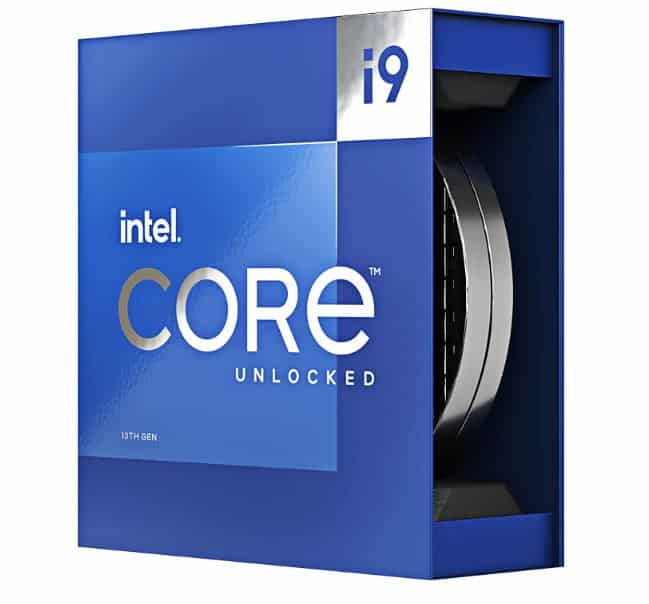
Intel Core i9-13900K and Core i5-13600K are two champion CPUs in Intel’s Raptor Lake Series. We’ll be more interested in discussing the performance of the Intel Core i9 13900K at this point.
Compared to the previous generation chips, the Intel Core i9 13900K shows 20% better gaming performance. And this performance leads has its effect on the AMD 7000 Series CPUs as well. Overall, the Core i9 CPUs deliver better performance in gaming as compared to AMD Ryzen 9 chips.
In boost clock speeds stretch, the Intel Core i9 13900K goes all the way up to 5.8 GHz, beating the Ryzen 9 7950X which stands at 5.7 GHz.
At the same time, Intel is planning to launch the 6 GHz model which will then put the gaming crown on the head of the Intel Raptor Lake Series. But for now, there’s Intel has to face tough competition from Team Red when it comes to marking their CPUs with the right price tag.
We’ve discussed earlier that the Intel Core i9 13900K is $60 expensive as compared to the Ryzen 9 7950X.
But paying extra $60 dollars brings you a lot of cores and boosts clock speed. Honestly speaking, you are getting a lot of performance by spending just a fraction of the money at this point.
At the same time, the backward compatibility of Raptor Lake CPUs with older DDR4 modules makes them a good-to-go deal for avid gamers who don’t want to invest in buying a DDR5-enabled motherboard.
This chip has 8 performance cores to deal with latency-sensitive tasks whereas 16 efficiency cores take care of multi-threaded and background tasks. So, you’ll get better performance with Core i9 13900K as compared to Ryzen 9 7950X when dealing with multiple tasks at the same time.
Intel has set the power demands of Core i9 13900K at 125W. This is the same amount of TDP that we had on most Alder Lake Series GPUs but a figure way less than Ryzen 9 7950X.
But we’ll still recommend you leave the stock cooler at one side and buy an aftermarket CPU cooler for better thermal results. Especially, if you are overclocking this CPU to squeeze more performance out of it, then you’ll need to invest in a high-quality water cooler.
In 3DMark Time Spy Extreme benchmark scores, the Core i9 13900K touched around 19154 points, which is slightly higher than we got with AMD Ryzen 9 7950X.
A similar benchmark carried out in Cinebench R23 by Videocardz shows that the Core i9 13900K scored around 2290 points in single-core performance. In multi-core performance, the Core i9 13900K goes all the way up to 35620 points with RTX 4090.
Again, both in single and multi-core performance, the Core i9 13900K beats the Ryzen 9 7950X. The advanced P/E cores on Core i9 13900K makes this chip the most powerful in single and multi-threaded workloads.
And when it comes to gaming, the Core i9 13900K squeezes every bit of performance out of the RTX 4090 graphics card. We played the same titles that we did with the Ryzen 9 7950X.
In Cyberpunk 2077 at 4K settings, the Core i9 13900K with RTX 4090 produced 60fps to 70fps most of the time. At these settings and fps, the CPU usage was around 92% whereas 13GB of VRAM was swapped out of RTX 4090.
Also, in Microsoft Flight Simulator 2020 at 4K settings, the average frame rates were between 110fps to 118fps. These numbers are close to what we got with the Ryzen 9 7950X CPU at the same settings. But this time, the load on the CPU was around 89% and nearly half of the VRAM on RTX 4090 was occupied.
This time with Red Dead Redemption 2, the Core i9 13900K managed to climb over 110fps when paired with RTX 4090. Even during the intense graphical scenes, the average frame rates didn’t fall below the 100fps line.
Scaling RDR 2 at 4K settings consumed 15GB of VRAM out of 24GB on RTX 4090 whereas the load on Core i9 13900K was around 93% most of the time.
Lastly, with Far Cry 6, the Core i9 13900K manages to throw over 115fps at 4K high settings. When compared to the Ryzen 9 7950X, the Core i9 13900K throws a bit more frame rates on your screen in Far Cry 6.
All in all, the Core i9 13900K gives you the most bang for your buck with Nvidia Lovelace cards. It’s slightly more expensive than the AMD Ryzen 9 7950X, but at the same time manages to yield more FPS in AAA titles.
AMD Ryzen 9 7900X – Price to Performance Ratio Pick
Architecture: Zen 4 | Cores: 12 | Threads: 24 | Base Clock Speed: 4.7 GHz | Boost Clock Speed: 5.6 GHz | TDP: 170W | Socket Compatibility: AM5
Reasons to Buy:
The Ryzen 9 7900X has the right resources and bandwidth to be in line with the RTX 4000 Series GPUs. It’s built on a 5nm process just like its Ryzen 7000 Series siblings and has stretched up to 5.6 GHz boost clock speeds under heavy workloads. It beats the Intel Alder Lake CPUs in single and multi-threaded workloads.
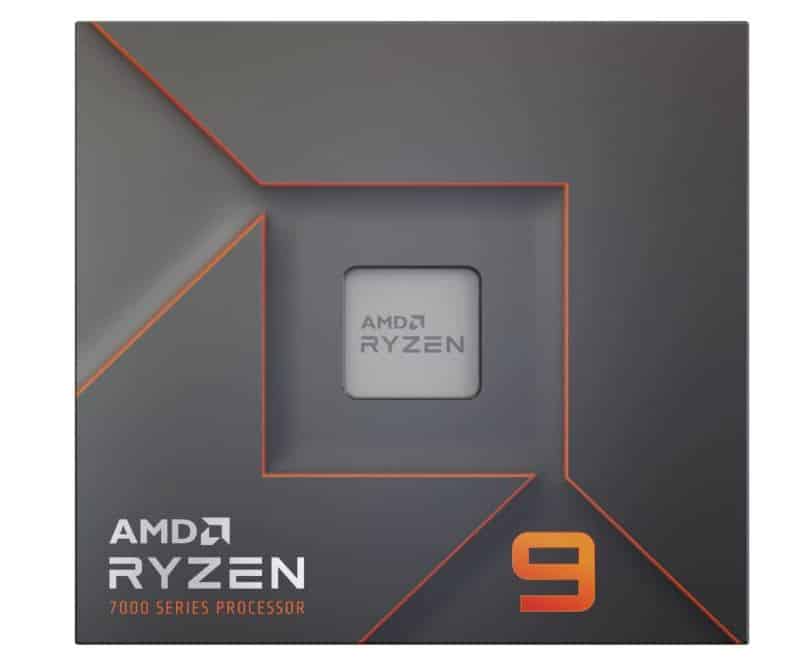
The Ryzen 9 7900X falls anywhere between the Ryzen 9 7950X and Core i9 12900K. It comes with 12 cores and 24 threads to deliver serious gaming and content creation performance for just a $549 price tag. AMD Ryzen 9 7900X is $50 cheaper than the flagship Ryzen 9 7950X CPU and slightly more expensive than the Alder Lake Core i9 12900K.
Just like the other chips in the Ryzen 7000 Series line-up, the Ryzen 9 7900X holds a higher base and boost clocks as soon as you install it in an AM5-compatible motherboard. However, the boost clock speed on this chip is 100 MHz than what we have on the flagship Ryzen 9 7950X.
But technically speaking, it merely touches the 5.6 GHz boost clock speed on its own. Even putting a lot of workload on this CPU bumps the clock speed up to 5.2 GHz at most. And if you need to push it even further, then you’ll need to overclock it.
The TDP rating on Ryzen 9 7900X is 170W, which is similar to the one we have on the Ryzen 9 7950X. But under heavy workload, this CPU draws up to 215W while peaking up to 90C.
So, for better thermal management, you’ll have to invest in premium quality CPU coolers like Corsair H115i 280mm AIO if you heavily rely on intensive workloads. But it’s up to you to pick the heatsink that you want to install on this CPU.
The Ryzen 9 7900X falls more towards productivity-minded users. It’s 15% better in productivity workloads as compared to the Core i9 12900K. And it continues the same legacy when you throw heavy AAA games on it. In some game titles, it even trades blows with the flagship Ryzen 9 7950X chip.
In the 3D Mark Time Spy Extreme benchmark, the Ryzen 9 7900X along with RTX 4090 manages to hit 19136 points which is closer to what we got with the Ryzen 9 7950X.
Also, in the Cinebench R23 benchmark, the Ryzen 9 7900X managed to score 2070 points in single-core performance. And in multi-thread scores, this chip goes all the way up to 29180 points.
Now, these scores are lower than the Ryzen 9 7950X and Core i9 13900K but higher than the Ryzen 9 5950X and other Ryzen 5000 Series chips.
Let’s move on with the performance of the Ryzen 9 7900X in gaming workloads. This time we started from the Apex Legends to see how Ryzen 9 7900X would perform with RTX 4090 at 4K settings.
In Apex Legends, the Ryzen 9 7900X managed to throw 130+ frame rates with RTX 4090 at 4K high settings. During the gameplay, there was a 20% load on the CPU and a 95% load on the RTX 4090.
Whereas in intensive games like Far Cry 6, it goes head to head with the Ryzen 9 5950X by scoring 95fps to 100fps at 4K settings. But that’s only possible when you turn off the extra ray tracing and lower some shadows in the game.
Likewise in Red Dead Redemption 2, the Ryzen 9 7900X delivers a whopping performance with RTX 4090 GPU by delivering up to 95fps in most scenes. Again, we’ve turned the ray-tracing to medium to squeeze as much fps as we could in this game.
Given that the Ryzen 9 7900X performs closer to Ryzen 9 7950X in most departments for a lower price, it’s up to you to decide which one to go with. If your workload depends on a lot of cores, then the Ryzen 9 7950X has some extra cores on it to get your work done.
At the same time, if you are limited to gaming, then 12 cores on Ryzen 9 7900X are enough to meet the demands of the toughest AAA titles. At least with RTX 4090, this CPU performs up to its maximum potential. You can expect the least bottleneck and higher performance at the same time.
AMD Ryzen 7 5800X3D – Best Budget CPU for GeForce RTX 4090
Architecture: Zen 3 | Cores: 8 | Threads: 16 | Base Clock Speed: 3.4 GHz | Boost Clock Speed: 4.5 GHz | TDP: 105W | Socket Compatibility: AM4
Reasons to Buy:
The Ryzen 7 5800X3D is an octa-core processor which delivers decent performance with RTX 4090 at a reasonable price. The additional 3D V-caching technology on the 5800X3D makes it a bit stronger in gaming as compared to its sibling, the 5800X. With lower TDP and support for older AM4 sockets, the 5800X3D is the best deal to go with.
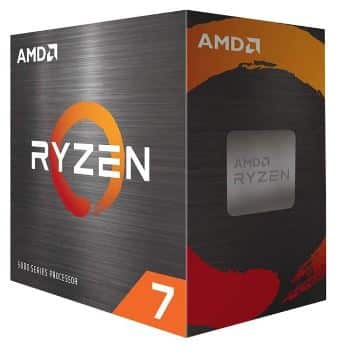
Where cores and frequencies were ruling the gaming world, everything changed with the arrival of 3D V-caching technology in a processor like Ryzen 7 5800X3D. Red Team has done a great job on this mid-range CPU by enabling 3D V-caching, which enables it to deliver unbeatable performance in AAA games.
The Ryzen 7 5800X3D is the first of its kind to brace this technology. And the main difference between the standard Ryzen 7 5800X and Ryzen 7 5800X3D is the presence of 3D V-caching on the latter one.
Where the standard Ryzen 7 5800X had only 32MB of L3 cache, the 5800X3D now takes it further to 96MB. The bigger L3 size cache enables the 5800X3D to communicate less with the RAM.
As we know that games are more dependent upon the L3 cache and cores of a CPU, and the 5800X3D keeps up with both of these factors to bring you the fastest gaming experience possible.
There are many small processes running in the background when you are playing games on your computer. So a CPU that has more cache and clock speed on it would compute those small processes quickly and efficiently.
Right out of the box, the 5800X3D delivers a whopping clock speed of 3.5 GHz and a boost clock speed of 4.5 GHz. And to keep up with a high-end graphics card like RTX 4090, I believe that Ryzen 7 5800X3D has got all that it takes to be on par with the current generation Nvidia cards.
And when there’s a card like RTX 4090 on your computer, you definitely want every game to run at 60fps and 4K settings. The Ryzen 7 5800X3D doesn’t let you down as it goes one on one with the Ryzen 9 5950X and Core i9 12900K in 4K gaming.
In some AAA games, the 5800X3D even pushes well against the Ryzen 9 7950X and the Core i9 13900K. The truth is, the Ryzen 7 5800X3D is roughly 10 to 15% faster than its non-3D variants in the Zen 3 family.
At last, the Ryzen 7 5800X3D supports the AM4 socket and DDR4 memory. As DDR4 memories are still cheaper than DDR5 memories and you can use your older AM4 motherboard to install this CPU, I believe going with the chip would save you a lot of money.
Benchmark Results
I just got time to play different games Ryzen 9 7950X and Core i9 13900K paired with RTX 4090 at FHD settings. Here are the maximum frame rates (FPS) that I got during my gameplay
| Game Title | AMD Ryzen 9 7950X | Intel Core i9 13900K |
| Assassin’s Creed Valhalla | 207 fps | 214 fps |
| Cyberpunk 2077 | 115 fps | 123 fps |
| Far Cry 6 | 121 fps | 148 fps |
| Forza Horizon 5 | 198 fps | 207 fps |
Verdict
Finally, all of these CPUs that we’ve reviewed in this guide deliver plenty of performance with an RTX 4090 card. If we had to pick from one of these, then it would be the AMD Ryzen 9 7950X. This CPU gives you the most price to performance ratio when paired with RTX 4090 or RTX 4080 card.
Also, the higher clock speed and PCIe 5.0 on Ryzen 9 7950X enable it to take full advantage of the higher bandwidth that comes with the RTX 4000 Series cards. Especially, if you are playing games that are dependent on the CPU, then Ryzen 9 7950X is the most suited option to go with.
If you have a little more money to spare from your budget, then the Core i9 13900K is the all-rounder CPU to pair with RTX 4090. This would be the most powerful combo to conquer gaming and content creation workloads.
FAQs
Will an i7 bottleneck a 4090?
It depends upon the i7 generation that you have on your computer. Let’s say you have an old Core i7 processor with just 2 cores, then there are higher chances of getting a bottleneck with an RTX 4090 card.
What CPU won’t bottleneck an RTX 4090?
According to my personal experience, you will need a current-generation CPU from AMD or Intel to keep up with the bandwidth demand of a card like RTX 4090. Both the Ryzen 9 7950X or Core i9 13900K are good to pair with RTX 4000 Series cards.
Is i7 12700K enough for RTX 4090?
Yes, the Alder Lake Core i7 12700K has enough juice to keep up with the pace of RTX 4090. Core i7 12700K comes with enough clock speed and cores to crush any CPU intensive game that you’ll throw on it.

Hi, my name is Masab, a die-hard PC enthusiast and founder of this blog. I love to share my prior experience with computers on this blog. Ask me anything about building a PC or troubleshooting PC errors, I’m here to help.

